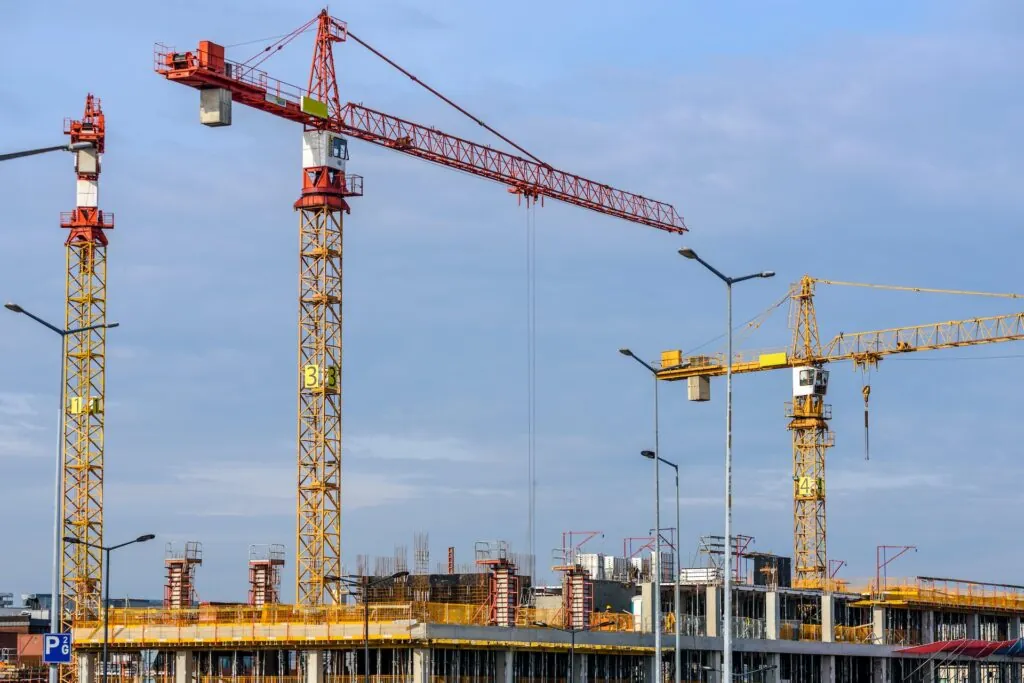Maritime Machinery Accident Lawyers
In the world of maritime work, using heavy machinery and equipment is just part of the job. If you’re in this line of work, you deal with these powerful tools every day. But with that comes a higher chance of getting hurt.
Getting injured because of a maritime machinery accident can turn your life upside down. Suddenly, you can’t do your job like before because of your injuries, medical appointments, and maybe even dealing with a disability that changes everything. Depending on how bad your injuries are, you might be planning to get back to work after healing for a bit. But, if the injuries are really serious, you might have to think about changing your job completely. And if you’re looking at a major injury, you’re going to need enough compensation to cover everything.

Call us today at 832-844-6700 for a free case evaluation with an experienced Houston work injury lawyer.
At Johnson Garcia, we understand what you’re going through after a maritime accident. Our team of dedicated Houston maritime lawyers is here to help you every step of the way. We’ve got the experience, the know-how, and the commitment to fight for the compensation you need. If an injury has knocked you off course, reach out to us.
We’ll listen to your story, dig into what happened, and work hard to get you the financial support you deserve. Our goal is to secure compensation for you that reflects the challenges you’re facing.
What Are the Common Causes of Maritime Machinery Accidents in Houston?
Maritime accidents often have devastating outcomes. These incidents are seldom minor and frequently result in severe or even fatal injuries. Lack of proper crew training is often a leading cause of these catastrophic workplace events. Even minor issues aboard can rapidly become major emergencies when the crew lacks experience. Ensuring comprehensive training for all crew members is a fundamental responsibility of their employers.
The following are common causes of maritime accidents:
- Negligence. Simple oversights by crew members can lead to fires or other disasters. Such negligence often stems from failing to adhere to safety protocols or improper maintenance of equipment, showcasing a dire need for constant vigilance and strict adherence to safety standards.
- Inexperienced Crew or Inadequate Training. The complexity of maritime operations demands highly skilled personnel. When crew members lack the necessary experience or training, their mistakes can lead to navigational errors, mishandling of equipment, or delayed emergency responses. This can significantly increase the risk of accidents.
- Cargo Tanker Explosions. These explosions are among the most feared events at sea, often caused by the ignition of flammable cargo. The catastrophic nature of these incidents highlights the critical importance of proper cargo handling and adherence to safety guidelines for hazardous materials.
- Marine Crane Incidents. Cranes play a vital role in loading and unloading cargo but can become sources of accidents when objects fall or when cranes collapse. These incidents point to the need for rigorous equipment checks and operator training.
- Equipment Failure. Faulty or poorly maintained equipment can fail unexpectedly, leading to serious accidents. Regular maintenance and inspections are crucial to prevent such failures, emphasizing the role of proper equipment upkeep in maritime safety.
- Collisions and Allisions. Collisions with other vessels or allisions with stationary objects like docks or bridges are common causes of maritime accidents. These incidents underline the importance of effective communication, precise navigation, and situational awareness among the crew.
- Severe Weather Conditions. Maritime operations are vulnerable to weather conditions. Storms, high winds, and rough seas can lead to accidents if vessels are not properly prepared or if crews fail to navigate these conditions safely.
- Improperly Secured Cargo. Shifts in unsecured or unevenly distributed cargo can cause vessels to list or even capsize. This underscores the necessity of meticulous cargo management and adherence to loading protocols.
What Types of Maritime Injuries are Caused by Machinery Accidents in Houston?
Maritime machinery accidents in Houston can lead to a wide range of serious injuries, each varying in severity but all having the potential to significantly impact the lives of maritime workers and their families. These incidents, often due to the heavy and complex nature of the machinery used on vessels and docks, can result in catastrophic outcomes. Here are some of the most common types of injuries resulting from machinery accidents in the maritime industry:
- Traumatic Brain Injuries. The impact from falls or being struck by heavy machinery can cause TBIs, ranging from mild concussions to severe brain damage. These injuries can lead to long-term cognitive issues, affecting a worker’s ability to return to work and perform daily activities.
- Spinal Cord Injuries. These are among the most severe consequences of maritime machinery accidents. They can result from heavy lifts, falls, or being caught in machinery, potentially leading to paralysis or other permanent disabilities.
- Amputations. The interaction with moving parts of machinery can tragically result in the loss of limbs or fingers. Such injuries not only require immediate medical attention but also long-term rehabilitation and adjustment to new ways of living.
- Burns. Explosions, fires, or electrical malfunctions involving machinery can cause severe burns, which may require extensive medical treatment, including surgeries and skin grafts, and can lead to scarring and disfigurement.
- Broken Bones and Fractures. The sheer weight and power of maritime machinery can easily break bones or cause fractures. Recovery from such injuries often involves surgery, physical therapy, and a significant amount of time away from work.
- Lacerations and Cuts. Sharp edges, moving parts, and even the breakdown of machinery can lead to deep cuts or lacerations, which might be complicated by infections or require surgical intervention to repair.
- Hearing Loss. Prolonged exposure to the loud noise of machinery without adequate protection can lead to temporary or permanent hearing loss, impacting a worker’s quality of life and ability to work in similar environments in the future.
- Chemical Exposures. Accidents involving machinery can also lead to exposure to harmful chemicals, leading to burns, respiratory issues, or long-term health conditions depending on the substance and level of exposure.
Given the severe and often life-altering nature of these injuries, victims may face not just physical challenges but also emotional and financial burdens. This highlights the critical role of specialized legal assistance in navigating the aftermath of such incidents.
The maritime machinery accident lawyers at Johnson Garcia possess the expertise to tackle these complex cases so that injured workers receive the comprehensive support and compensation they need. By addressing the legal challenges head-on, our maritime accident lawyers at Johnson Garcia aim to alleviate the additional stress on victims and their families, allowing you to focus on recovery and rehabilitation.
How Does Employer Negligence Contribute to Machinery Accidents?
Employer negligence plays a significant role in contributing to machinery accidents in the maritime industry. When employers fail to adhere to safety regulations, properly maintain equipment, or provide adequate training, they put their employees at a high risk of injury or even death. Here’s how employer negligence can directly impact the safety of maritime workers and lead to machinery accidents:
- Inadequate Training and Safety Procedures. Employers are responsible for ensuring that all workers are fully trained in the operation of machinery and aware of safety procedures. Neglecting this duty can lead to errors in machinery use, mishandling of equipment, and accidents that could have been prevented with proper training.
- Poor Maintenance of Machinery. Regular maintenance is crucial to keeping machinery safe and operational. When employers cut corners or delay maintenance, they increase the risk of mechanical failures that can cause serious accidents and injuries.
- Failure to Provide Safety Equipment. Providing workers with appropriate safety gear is a basic employer responsibility. Lack of protective equipment like helmets, gloves, and safety glasses can lead to severe injuries from accidents that could have been mitigated or avoided.
- Ignoring Safety Regulations. Maritime operations are governed by a variety of safety regulations designed to protect workers. When employers disregard these regulations, they expose workers to unnecessary risks. This includes failing to conduct regular safety drills, not updating safety plans, or not adhering to industry standards for equipment and operation.
- Overworking Crew Members. Fatigue from long hours or insufficient rest breaks can impair judgment and reaction times, increasing the likelihood of accidents. Employers who overwork their staff or ignore regulations on work hours contribute to a hazardous work environment.
- Lack of Communication. Effective communication is key to preventing accidents. Employers who fail to establish clear communication channels or protocols for reporting safety concerns or machinery issues can inadvertently contribute to accidents.
- Neglecting Environmental and Weather Considerations. In the maritime industry, weather and environmental conditions can greatly affect machinery operation. Employers who fail to take these factors into account or push operations forward in unsafe conditions are neglecting their duty to maintain a safe working environment.
The impact of employer negligence on maritime machinery accidents cannot be overstated. It not only endangers the lives of workers but also leads to legal liabilities for the employers. Victims of such negligence have the right to seek compensation for their injuries, losses, and suffering.
This is where the expertise of our Houston maritime machinery accident lawyers at Johnson Garcia becomes invaluable. With a deep understanding of maritime law and employer responsibilities, we help victims navigate the complex legal landscape, hold negligent employers accountable, and secure the compensation they deserve.
How Can the Maritime Machinery Accident Lawyers at Johnson Garcia Help?
Maritime law is complex, with state, federal, and international regulations determining recoverable damages. At Johnson Garcia, our lawyers are deeply familiar with these nuances, especially concerning the Jones Act and other critical legislation that protect maritime workers.
- Identifying Liability. Our initial step is pinpointing who’s responsible for the accident, whether it’s the employer, equipment manufacturer, or another entity. This crucial phase sets the foundation for pursuing justice.
- Legislation and Evidence. We leverage our comprehensive understanding of maritime laws to support our clients’ claims. We simultaneously gather all necessary evidence, from medical records to eyewitness accounts, to build a robust case.
- Filing Claims and Court Representation. With a strong case, we file claims that accurately represent our clients’ injuries and losses. When necessary, we’re fully prepared to represent our clients in court, advocating vigorously to secure the compensation they rightfully deserve.
Our goal at Johnson Garcia is to relieve our clients of the legal complexities, allowing them to focus on recovery. With our seasoned maritime machinery accident lawyers, clients receive dedicated support. We leverage our expertise to safeguard your rights, and we’ll fight to secure the compensation you’re entitled to.
Have you been injured in a maritime machinery accident? Don’t navigate these troubled waters alone. Call us today at 832-844-6700 or reach out to us online for a free consultation.
Related Pages
FREE CASE REVIEW
START YOUR JOURNEY TOWARDS JUSTICE
No Fee Unless We Win!
Johnson Garcia LLP
-
7324 Southwest Fwy, Suite
545 Houston, TX 77074 - 832-402-9332
- Available 24/7
FREE CASE REVIEW
START YOUR JOURNEY TOWARDS JUSTICE

